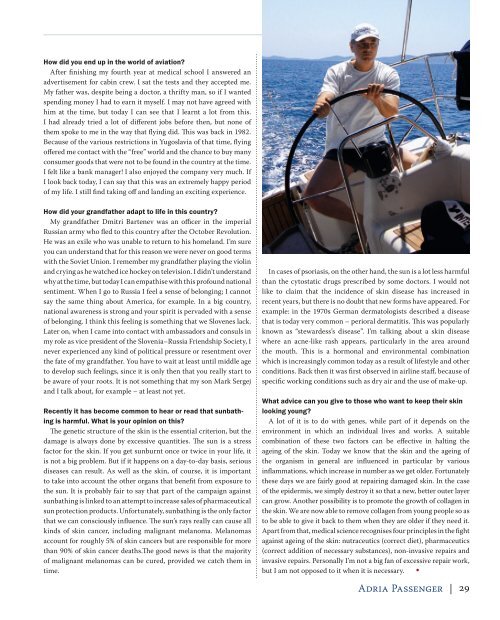Create successful ePaper yourself
Turn your PDF publications into a flip-book with our unique Google optimized e-Paper software.
How did you end up in the world of aviation?After finishing my fourth year at medical school I answered anadvertisement for cabin crew. I sat the tests and they accepted me.My father was, despite being a doctor, a thrifty man, so if I wantedspending money I had to earn it myself. I may not have agreed withhim at the time, but today I can see that I learnt a lot from this.I had already tried a lot of different jobs before then, but none ofthem spoke to me in the way that flying did. This was back in 1982.Because of the various restrictions in Yugoslavia of that time, flyingoffered me contact with the “free” world and the chance to buy manyconsumer goods that were not to be found in the country at the time.I felt like a bank manager! I also enjoyed the company very much. IfI look back today, I can say that this was an extremely happy periodof my life. I still find taking off and landing an exciting experience.How did your grandfather adapt to life in this country?My grandfather Dmitri Bartenev was an officer in the imperialRussian army who fled to this country after the October Revolution.He was an exile who was unable to return to his homeland. I’m sureyou can understand that for this reason we were never on good termswith the Soviet Union. I remember my grandfather playing the violinand crying as he watched ice hockey on television. I didn’t understandwhy at the time, but today I can empathise with this profound nationalsentiment. When I go to Russia I feel a sense of belonging; I cannotsay the same thing about America, for example. In a big country,national awareness is strong and your spirit is pervaded with a senseof belonging. I think this feeling is something that we Slovenes lack.Later on, when I came into contact with ambassadors and consuls inmy role as vice president of the Slovenia–Russia Friendship Society, Inever experienced any kind of political pressure or resentment overthe fate of my grandfather. You have to wait at least until middle ageto develop such feelings, since it is only then that you really start tobe aware of your roots. It is not something that my son Mark Sergejand I talk about, for example – at least not yet.Recently it has become common to hear or read that sunbathingis harmful. What is your opinion on this?The genetic structure of the skin is the essential criterion, but thedamage is always done by excessive quantities. The sun is a stressfactor for the skin. If you get sunburnt once or twice in your life, itis not a big problem. But if it happens on a day-to-day basis, seriousdiseases can result. As well as the skin, of course, it is importantto take into account the other organs that benefit from exposure tothe sun. It is probably fair to say that part of the campaign againstsunbathing is linked to an attempt to increase sales of pharmaceuticalsun protection products. Unfortunately, sunbathing is the only factorthat we can consciously influence. The sun’s rays really can cause allkinds of skin cancer, including malignant melanoma. Melanomasaccount for roughly 5% of skin cancers but are responsible for morethan 90% of skin cancer deaths.The good news is that the majorityof malignant melanomas can be cured, provided we catch them intime.In cases of psoriasis, on the other hand, the sun is a lot less harmfulthan the cytostatic drugs prescribed by some doctors. I would notlike to claim that the incidence of skin disease has increased inrecent years, but there is no doubt that new forms have appeared. Forexample: in the 1970s German dermatologists described a diseasethat is today very common – perioral dermatitis. This was popularlyknown as “stewardess’s disease”. I’m talking about a skin diseasewhere an acne-like rash appears, particularly in the area aroundthe mouth. This is a hormonal and environmental combinationwhich is increasingly common today as a result of lifestyle and otherconditions. Back then it was first observed in airline staff, because ofspecific working conditions such as dry air and the use of make-up.What advice can you give to those who want to keep their skinlooking young?A lot of it is to do with genes, while part of it depends on theenvironment in which an individual lives and works. A suitablecombination of these two factors can be effective in halting theageing of the skin. Today we know that the skin and the ageing ofthe organism in general are influenced in particular by variousinflammations, which increase in number as we get older. Fortunatelythese days we are fairly good at repairing damaged skin. In the caseof the epidermis, we simply destroy it so that a new, better outer layercan grow. Another possibility is to promote the growth of collagen inthe skin. We are now able to remove collagen from young people so asto be able to give it back to them when they are older if they need it.Apart from that, medical science recognises four principles in the fightagainst ageing of the skin: nutraceutics (correct diet), pharmaceutics(correct addition of necessary substances), non-invasive repairs andinvasive repairs. Personally I’m not a big fan of excessive repair work,but I am not opposed to it when it is necessary. •Adria Passenger | 29


